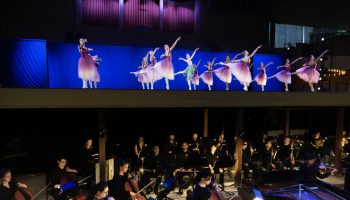
Opera is a suspension of time, according to voice student Amanda Lynn Bottoms.
“In real life, we just say, ‘I love you.’ In opera, it’s a six-minute aria about ‘I love you’ so that we have time to process that very deep feeling,” said Bottoms, who is undertaking the titular role Carmen. “So we can sit there, and every time they repeat ‘I love you,’ it either empowers us or pains us, or burdens us (or) releases us. There are so many things with each reiteration.”
Bottoms and the other Chautauqua voice students will perform Georges Bizet’s Carmen at 8:15 p.m. Monday, August 6, in the Amphitheater with live orchestral music played by the Music School Festival Orchestra.
Bizet’s music, according to John Giampietro, director of the production, is “one of the greatest pieces of music in the history of Western classical music.”
And the MSFO has a significant role in creating the ambience for the storytelling, according to Timothy Muffitt, MSFO music director. In Carmen, Bizet often uses the orchestra to create a “sense of time and place,” Muffitt said.
“This opera is full of full-throated orchestral music where there’s no one even singing,” Muffitt said. “So the orchestra has a lot to do in terms of telling the story, especially on those purely orchestral interludes, where we, in a musical way, are setting the stage for the action to come.”
To create music that works well for opera, Muffitt said, the 80-plus instrumentalists in the orchestra pit need to be intensely aware of balance when working with singers.
“Opera, by the nature of the genre, is usually a very intimate kind of music making because we have one person singing,” Muffitt said. “But the forces in play are anything but intimate — we have a full symphony orchestra down there. And so, it calls upon the (MSFO) players to really connect with the people on stage and have an awareness of surrounding, unlike any other kinds of music making.”
Bottoms said there are things about Carmen she can relate to, and there are also things about the character that “drive her crazy,” like her narcissism.
“Her thirst for freedom is an amazing thing, but it’s always at the cost of others,” Bottoms said. “… She would never want to be free with a lover; she would want to be free to leave that lover. But she doesn’t want him to be free to come and go. It’s on her terms at all times.”
Carmen is a frequently performed opera, and Bottoms said many of its elements make it popular.
“We love the character so much. We love the songs, which are so close to French pop songs of the time,” Bottoms said. “There is just something so endearing about these people living this larger-than-life life. And loving without boundaries. There’s something so brave about that.”
But it is dangerous to only see the opera that way, according to Bottoms. She said despite the grandness and popularity of Carmen, there is “a very important narrative” happening within the piece.
“We often forget, ‘Oh, it ends in (Carmen) being stabbed and murdered at the end,’ ” Bottoms said.
Because Carmen refuses to leave her new lover to be with Don José, her old lover, he kills her.
“In the novella that (the opera) comes from, (Don José) kills her and says, ‘It’s the gypsy’s fault’ for the way you were raised, for what they taught you,” Bottoms said. “He doesn’t take any of the blame. … But at the end of (both the novella and the opera), the same untimely end happens to her.”
Bottoms said there is a lack of balance in regard to what each gender can do without facing certain consequences.
“And we have to come to terms with (that),” Bottoms said. “Do we say, ‘OK, Don José was justified?’ Do we say Carmen is a victim of circumstance, a victim of a world — (in which) if a man does that and a woman retaliates, she’s crazy? But if a woman does it, and a man would retaliate, (people would say), ‘Oh well, she’s a seductress, she’s a temptress, and she led him to do this.’ ”
Bottoms said Carmen is still relevant. Similar stories happen in real life, Bottoms said, like “when a woman rejects a man and he stabs her to death or shoots her because she wouldn’t want to (go on a) date with him.”
According to Giampietro, Carmen is a complicated story with complicated issues, “especially through today’s lens of the #MeToo movement and discussions on equality of the sexes and privilege and patriarchy.”
Giampietro said some of the themes in masterpieces like Carmen need to be questioned and re-examined.
“I believe that Carmen is not a love story. It’s about the murder of a woman who simply wanted the same freedoms that were afforded (to) any male in society,” Giampietro said. “Because she wanted that, she lived for that kind of freedom, she was killed. And I think now, our society has been having a discussion about equality and the persistence of the patriarchy.”
Giampietro said tonight’s production of Carmen is going to re-examine that story because “we can’t romanitize these stories any more.”
“One of the main questions that we are asking in this production is ‘What is our responsibility for the society that creates a Carmen?’ and ‘What is our responsibility in her death?’ ” Giampietro said.
Giampietro’s approach in directing this production is acknowledging Carmen as a masterpiece while finding “a new interpretation that doesn’t dilute the original.”
By bypassing traditional design elements that set Carmen in romanticized Spain in order to illuminate the heart of the piece, Giampietro hopes to get rid of the distractions of “how beautiful, … hot and sunny Spain is,” in order to “strip everything down” to Carmen’s origin. This production will be “about people and the society that creates this culture and makes a Carmen necessary” and “our ultimate culpability in her death.”
According to Mikhaela Mahony, assistant director of Carmen, tonight’s production will be a little abstract and minimalist.
“The space is created through bodies and through how (people on stage) move gesturally… For example, there’s a scene (in which) one character is in a threatening landscape or a scary space. Rather than create that through a set, we create that through a series of humans on stage being menacing,” Mahony said. “It’s beautiful. It feels to me a very visually stunning production, using the simplest means.”
Bottoms said the chorus is on stage almost 95 percent of the time, and Voice Chair Marlena Malas said in the way Giampietro directs Carmen, every cast member is special. Bottoms said the chorus will go from being “part of the action to being an (on-stage) audience member.”
“It’s very jarring to be going from being an audience member, or a chorus member to being a member of the scene,” Bottoms said. “And I think the audience is going to be very moved to be sympathetic and empathetic to what (the characters) are experiencing, and therefore empathetic to what Carmen, Micaela or Don José, Escamillo — to anything that anyone on stage is experiencing.”




